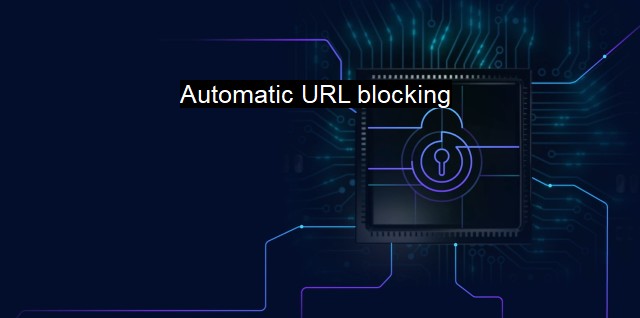What is Automatic URL blocking?
The Importance of Antivirus Features: Exploring Automatic URL Blocking in Cybersecurity
The advancement of technology not only provides exceptional convenience but also engenders unconventional forms of cyber threats. Having a defensive line is crucial in a virtual setting, and one of the potent tools used in cybersecurity is automatic URL blocking. Understanding its functionalities and importance is essential, especially in preserving the integrity of various internet-based systems and online activities.Automatic URL blocking, as the term implies, involves the automatic disabling or disallowing access to particular URLs or websites believed to harbor malicious or harmful content. Often, an antivirus or firewall incorporated in a cybersecurity system performs this function, detecting and preventing any possible threat. The system may completely block the website or simply issue an alert to apprise users about potential risks.
By assessing certain signals, automatic URL blocking systems identify suspicious websites. These signals could range from the lack of noticeable contact details to mixed-content web pages or the assessment of third-party resources associated with the website. When these benchmarks are reached and surpassed, the URL blocking tool recognizes that there may be cybersecurity threats affiliated with the web page. Therefore, it immediately instigates its security protocol to inhibit access to such places in cyberspace.
Unreliable websites often masquerade benign content while thriving with concealable and harmful malware, these include phishing sites, dummy sites meant to exploit vulnerabilities in the security system, the black-hat Search Engine Optimization (SEO) sites, or hacking sites. Automatic blocking software can usually recognize the dangers of these sites using sophisticated algorithms, for instance pattern recognition algorithms designed to identify usual behaviors or elements of malicious sites.
Modern malware often employs innovative evasion methods to avoid being detected and blocked by conventional antivirus solutions. automatic URL blocking holds a significant advantage in one aspect — it looks at a website's characteristics comprehensively rather than merely focusing on individual potentially malicious files. In other words, the nature of automatic URL blocking is such that it does not only clamp down on the contents of the suspicious website, it seizes the entire site.
Automatic URL blocking also supports other cybersecurity measures that operate in a more granual approach. These include assessing whether a website's digital certificate is legitimate or not, and whether the website uses a secure connection. It can detect harmful malware links hiding in seemingly benign web pages, email links or downloadable files, block pop-up ads from unreliable sources, and interrupt transactions with untrusted sites.
Many antivirus suites today come equipped with automatic URL blocking, adding an extra layer of security to the system. it's vital to keep them up-to-date as cyber threats evolve rapidly. Fresh signatures and configurations need to be regularly updated in these systems to stay ahead of new threats.
It is important to note that no security measure is infallible, and automatic URL blocking is not an exception. Falsely flagged or over-blocked websites can occur, causing legitimate websites to be blocked due to misinterpretations by the system. Therefore, systems should have a fast and efficient correction process, and users should always be allowed to make a manual review and unblock websites they believe have been blocked by mistake.
Although internet users need to be savvy in utilizing the world wide web safely, automatic URL blocking adds another robust level of protection. By understanding and leveraging its capabilities and constraints, end users can maintain dynamic online experiences while reducing risk of falling prey to persistent cyber threats. This could prevent excessive financial losses, maintain online reputation, and ultimately protect the valuable data and privacy that would otherwise be at risk.

Automatic URL blocking FAQs
What is automatic URL blocking?
Automatic URL blocking is a feature of some cybersecurity and antivirus software that prevents users from accessing websites that are known to be malicious or potentially harmful.How does automatic URL blocking work?
Automatic URL blocking works by comparing the URLs of websites that users attempt to visit against a database of known malicious or potentially harmful websites. If there is a match, the user is prevented from accessing the website, and a warning or notification is displayed.What are the benefits of automatic URL blocking?
The benefits of automatic URL blocking include increased protection against cyber threats, enhanced security for sensitive data, and reduced risk of malware, viruses, and other attacks.Are there any drawbacks to automatic URL blocking?
One potential drawback of automatic URL blocking is that it may occasionally block legitimate websites that have been incorrectly classified as malicious or harmful. Additionally, some users may find the feature intrusive or restrictive, especially if they need to access websites that have been blocked for legitimate purposes. However, these issues are typically rare and can be addressed through manual whitelisting or other mitigation strategies.| | A | | | B | | | C | | | D | | | E | | | F | | | G | | | H | | | I | | | J | | | K | | | L | | | M | |
| | N | | | O | | | P | | | Q | | | R | | | S | | | T | | | U | | | V | | | W | | | X | | | Y | | | Z | |
| | 1 | | | 2 | | | 3 | | | 4 | | | 7 | | | 8 | | |||||||